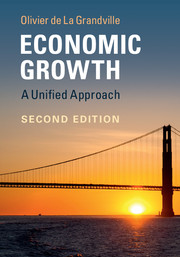Book contents
- Frontmatter
- Dedication
- Contents
- Foreword
- Preface to the second edition
- Introduction to the first edition
- PART I POSITIVE GROWTH THEORY
- PART II OPTIMAL GROWTH THEORY
- 9 Optimal growth theory: an introduction to the calculus of variations
- 10 Deriving the central equations of the calculus of variations with a single stroke of the pen
- 11 Other major tools for optimal growth theory: the Pontryagin maximum principle and the Dorfmanian
- 12 First applications to optimal growth
- 13 Optimal growth and the optimal savings rate
- PART III A UNIFIED APPROACH
- In conclusion: on the convergence of ideas and values through civilizations
- Further reading, data on growth and references
- Index
11 - Other major tools for optimal growth theory: the Pontryagin maximum principle and the Dorfmanian
from PART II - OPTIMAL GROWTH THEORY
Published online by Cambridge University Press: 01 December 2016
- Frontmatter
- Dedication
- Contents
- Foreword
- Preface to the second edition
- Introduction to the first edition
- PART I POSITIVE GROWTH THEORY
- PART II OPTIMAL GROWTH THEORY
- 9 Optimal growth theory: an introduction to the calculus of variations
- 10 Deriving the central equations of the calculus of variations with a single stroke of the pen
- 11 Other major tools for optimal growth theory: the Pontryagin maximum principle and the Dorfmanian
- 12 First applications to optimal growth
- 13 Optimal growth and the optimal savings rate
- PART III A UNIFIED APPROACH
- In conclusion: on the convergence of ideas and values through civilizations
- Further reading, data on growth and references
- Index
Summary
Complex dynamic systems, in particular those with inequality constraints, have made it necessary to extend the classical calculus of variations. This work has been carried after the Second World War by Richard Bellman in the United States, in the form of dynamic programming, and by Lev Pontryagin and his associates in Russia. This latter contribution is also called “optimal control theory”; its central result is known as the Pontryagin maximum principle.
The full-fledged maximum principle requires some very advanced mathematics and its proof extends over some 50 pages. We will indicate here only the result in its simplest form, using the beautiful economic interpretation of this principle that was given by Robert Dorfman (1969). The power of Robert Dorfman's analysis will be obvious: not only does it permit us to solve dynamic optimization problems, but it will also enable us to obtain the classical results of the calculus of variations (the Euler–Lagrange equation and its extensions) through economic reasoning.
But the reason why Dorfman's contribution is so important is that it goes well beyond a very clever, intuitive, explanation of the Pontryagin maximum principle. Robert Dorfman introduced a new Hamiltonian, which has profound economic significance. To honour Professor Dorfman's memory, we call this “modified Hamiltonian” a Dorfmanian. In turn this Dorfmanian can be extended to obtain all high-order equations of the calculus of variations (the Euler–Poisson and the Ostrogradski equations).
The reader will notice in this chapter and those that follow that many tools are at his disposal to solve the simple variational problems of optimal economic growth: he can use the classical calculus of variations, the Pontryagin maximum principle and the Dorfmanian. He may then ask two questions: is one of the methods to be preferred? And if the choice between methods is completely open, would some be redundant? For simple problems like the ones we will deal with, there is indeed complete equivalency in the methods. But there is certainly no redundancy: the Dorfmanian offers remarkable insights which are not present in the calculus of variations, and we would never have been able to prove the second part of Adam Smith's theorem, as enunciated in our introduction, without the Dorfmanian. We hope that this will be evident to the reader in chapter 18.
- Type
- Chapter
- Information
- Economic GrowthA Unified Approach, pp. 231 - 242Publisher: Cambridge University PressPrint publication year: 2016



